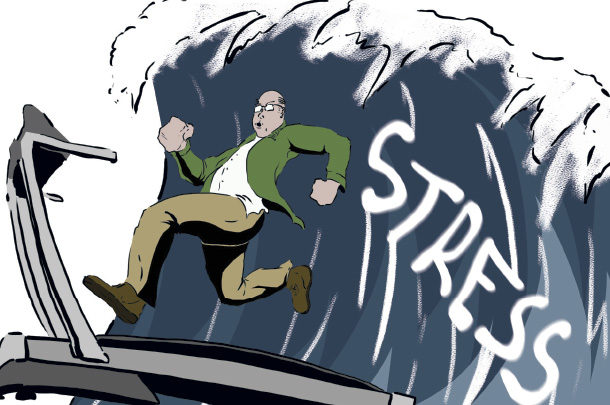I have a niche job of helping stubborn farmers work better together. To say the least, it is a high-stress job.
Initially, I dealt with this stress by milking cows every night (my form of yoga), but then I got swamped with customers, decided to get married and had kids. When I married and moved from rural Ontario to Iowa, I had to get a routine physical. It revealed my resting blood pressure was off the charts. The doctor wrote me a prescription for heart pills. I was working 16-hour days, not exercising and taking advantage of my wife’s darn good cooking. I foolishly thought that with the medication, the problem was solved, so I didn’t do much to change my lifestyle. When COVID-19 shutdowns arrived, it brought an opportunity to gain extra pounds – which I took, regretfully.
The doctor told me to rein back on my job or die. It’s probably similar to what your psychiatrist told you about farming the day he prescribed you medication for your mental health problems. It’s just not going to happen. I might semi-retire when I’m 85, but not until then. Although it’s tough, we love what we do.
The problem we all fall victim to is the belief that pills are going to solve the problem.
Although I think of myself as a farmer, it took a near-death experience for me to accept the reality that I now spend most of my day on the phone and not milking cows like I used to. As a farm boy, I laughed at fools who went to gyms and stated belligerently that “treadmills are only for hamsters.” I could pretend my token day of forking manure out of my kids’ chicken coop is exercise, but I’d be lying to myself.
I had to see myself for who I am, not how I think about myself.
I’m now on the treadmill at 4 a.m., working out twice daily and eating the same darn low-carb, low-calorie, low-salt, low-everything diet … every stinking day. I am still fat, but I’m working on it.
The moral to this self-deprecating story is that it’s going to take a long time for me to come off my medication, but I’m working toward it. I realize medication alone isn’t going to solve the problem, and if I believe heart pills are going to solve everything, then I’m going to die sooner rather than later. I need to address the stress factors that cause me to have high blood pressure. I’m not going to give up my job, but I can change my diet, exercise daily and change the perspective of how I deal with the problems I face daily.
Why am I telling you this story? Because more than 20% of farmers are on one type of mental health medication or another. Over half of family farms have a loved one on medication. I think it is great that the stigma to addressing mental health problems is quickly evaporating and more farmers are getting medical treatment. But taking a pill isn’t the be-all-and-end-all. That is where we get mixed up.
More farmers are talking about the importance of mental health. Few are talking about emotional health. What is the difference? Mental health is the match, and emotional health is the gasoline.
The textbook definition of “emotional health” according to familydoctor.org:
People who are emotionally healthy are in control of their thoughts, feelings and behaviors. They’re able to cope with life’s challenges. They can keep problems in perspective and bounce back from setbacks. They feel good about themselves and have good relationships.
Your emotional health greatly influences the stressors that impact your mental health.
For the family member who is now on medication to address mental illness, have they addressed their emotional health? Do their issues still perpetuate? Ask yourself some tough questions:
- When they encounter problems, how are they reacting? How quickly do things escalate from good to crappy? How often does a problem cause them to be in a bad mood for the rest of the day?
- Are they dealing with problems proactively, or do they procrastinate or sometimes shift blame?
- Do they feel stuck in between a rock and a hard place between their relationship with their spouse (or child) and business partners? Do they feel stress because of divided loyalties?
- Do they judge themselves based on what family members say rather than being self-confident?
- Do they feel they are in control of their life circumstances, or do they feel life is controlling them?
This is just the start of a list of factors that impact emotional health which, if not addressed, causes the stress factors triggering (and re-triggering) the mental health crisis on many family farms.
More importantly, what kind of business environment have you created for your loved one? For a few weeks after a family member comes back from seeking help, the family members are walking on eggshells. They off-load some responsibility, maybe even make a few strategic changes like selling the cows to reduce the stress – but a few years later, it’s still the same. The farm culture hasn’t changed, and there are different problems to deal with.
Just like patients, families may think medication will solve everything. They never want to recognize that the business environment might have been a contributing factor to a partner’s mental illness. We want to blame genetics or a person’s lifestyle, never family dynamics or the stress factors at work.
Ask yourself some tough questions about your family’s business culture:
- If I put your partners in different rooms and asked them to describe how the farm was going to look in five years, would everyone have the same answer? Are goals aligned, or is the future a mystery?
- Does your family place 80% effort into fire prevention or firefighting? Do you operate from one crisis to the next, or is your family disciplined to fix the root issues so they don’t reoccur?
- Does everyone just do whatever they want, or is there a culture of discipline/accountability?
- Is your family passive-aggressive, sweeping problems under the carpet, and then eventually the lid boils off the pot? Do problems get constructively resolved, or do you just constantly bicker?
- On most days, is everyone whistling on the way home from work or leaving in a foul mood?
Can you relate to any of the above questions? How is a dysfunctional family business culture impacting your farm’s decision-making and profits? How is this causing stress and unhappiness for everyone? Why spend the next decade in a workplace that is stressful? Why be in a spot in a few years where you have to keep an eye on a loved one in fear they might be suicidal?
If you have a loved one whose mental health is a concern, please know medication isn’t going to solve everything. Going to counseling isn’t going to solve everything. It’s going to be a revolving door at the hospital until you fix the fundamentals of what is causing your loved one stress at home, on the farm or both.
I have to drop my weight from 220 to 180 pounds. Do you think I like eating egg whites and broccoli? No, but I’m facing a hard truth and doing something about it. If you have a family member with a mental illness, you need to do whatever needs to be done to fix your farm’s business culture, reduce the stress and make it a place where anyone would want to work. It’s tough to admit, but it’s that simple.
Pills aren’t going to fix the root problem. Only changing your family’s business culture will.






